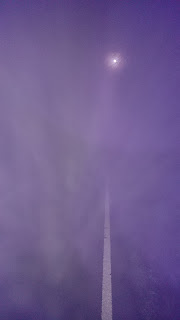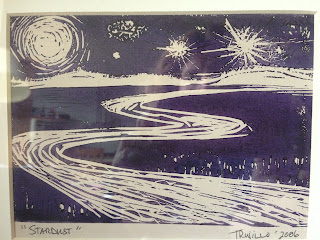As soon as we saw the sign, we made up a song with the words: Stumpcross Caverns and the Coldstones Cut. You invented a kind of jazz riff to go with it, tapped out the rhythm on the dashboard. We kept muddling up the words, had to practise several times to get it right, had to debate the best tune to go with it. But there was no debate about what we needed to do. We had to go there.
But, before we did, we walked along the riverside hand in hand talking. We were always talking. I try to remember now what we talked about along that river and during that time, that precious three days together in North Yorkshire. It was exactly a month before you died. It would have been utterly unthinkable to us then that you might be about to die. It is still utterly unthinkable to imagine that you did.
I remember talking about sailing. We were on the other side of the river then. We were trying to walk a circular route. I was trying to take you to an art gallery that I'd been to with my young husband over twenty years earlier, but it was gone, replaced by some kind of chain pub. Wherever we went, the sailing kept coming back. You'd read books about sailing for years and worked on boats in your youth but you'd never really learned to sail properly. 'What are you waiting for Blacksmith?' I said. 'You're fifty-three. If you want to sail round the world, get yourself some lessons.' And then I said that I'd be sad if you left me to sail round the world but that I wanted you to fulfil your dreams. I only ever wanted the best for you and you for me. With you I learned that that's what love is. Sometimes, you would say, 'I just want to possess you,' and yet you let me be myself, would have set me free if you thought it was for the best. For the record, it wasn't for the best. I wanted to be possessed.
You stopped to take photos of doors and I walked on ahead. We had this joke that if we needed space we would set up elaborate signals to each other. We never needed space, weren't together enough to tire of each other, but it kept us entertained. I did the yogic tree pose from my position down the road and you replied by doing a blacksmith arabesque by the doors. (How it made me smile and cry to see a photo of you in that pose from years ago on the memorial Facebook page after your death.) Then we spotted a tiny path leading back down to the river and ducked under the leaves back to the van.
It was a week of mostly walking (and talking and Scrabble and swimming and reading and writing and making love - the perfect break). The day before, we'd clambered up Brimham Rocks and gone through the charade of trying to shift the giant rocks with our bare hands. (Somewhere there should be photographic evidence of you playing the caveman, pretending to topple the rocks down the hillside. They must be on your phone. The police should release your phone soon, surely. There is no longer an investigation. The case is closed. You died of natural causes. Nothing untoward except for the abomination of a heart filled with love that stopped beating one random night in March.)
We stopped in a jeweller's workshop. You chatted to the jeweller about rivets and working with titanium and I was proud to be with you, enjoying your interest in the craft she was engaged in. I asked you if you'd ever tried to make jewellery - you were a metalworker, after all - and you said that you had plans to make me something. 'I've been saving silver in a coffee pot for years,' you said. It made me laugh and I wrote it down in my notebook. Only you could have silver stored in a coffee pot. (We found the silver after you died and I wrote to the jeweller. She says she will make me something with the silver and titanium. It won't be quite the same but it will be nice to wear your ring, even so.)
We ate lunch in a cafe in Pateley Bridge and then we headed to the Cut. We missed out the Caverns. I prefer to be up high, not down below. It was bitterly cold and windy as we assailed the hillside next to the quarry, striding towards the massive limestone sculpture carved into the landscape. We chased each other round the maze like children and stood, wrapped in each other's arms, staring at the view, like sailors on the deck of ship. We didn't stay long. We hurried back down the hill and holed ourselves up in a cosy cafe. I got out my notebook and wrote this poem while we drank tea and you leafed through a magazine. Perfectly content, alongside each other.
I read the poem at the funeral but I had to change the last line. I couldn't bear to stand up there and break the already broken hearts of the congregation with my own heartbreak. I had to give them some hope, even though I had lost mine. And so I changed it to 'through love, we live again.' It is true, we do. And we love even though death can tear us apart.
Stump Cross Caverns
and the Coldstones Cut
The stones are cold, sober and grey,
sand in the wind, whipping around a spiral
sculpture, cut from the cliff,
a giant conch swirling up the hillside,
ice cream on a cone
but made of stone.
I am not alone.
You are my buffer against the breeze,
forging a path through the maze,
smiles frozen, eyes ablaze.
I put my hand in your glove,
remember honeymoon days of youthful love
as we race time around the bend.
You and I are streadfast friends.
On the banks of the Nidd, in Pateley Bridge,
artists trade silver and glass for cold hard cash.
We tread the well-worn river's path,
laugh our way through the bleakness.
You smell of metal and sweat and sweetness.
We marvel at doors we won't walk through
and you glimmer like a hint of February spring
bringing sunshine to everything,
daffodils in the snow.
And down we go, slipping through the snicket
arched with leaves. We are thick as thieves
stealing a moment as precious as titantium
as a light fans into a flame.
With you I start to live again.











